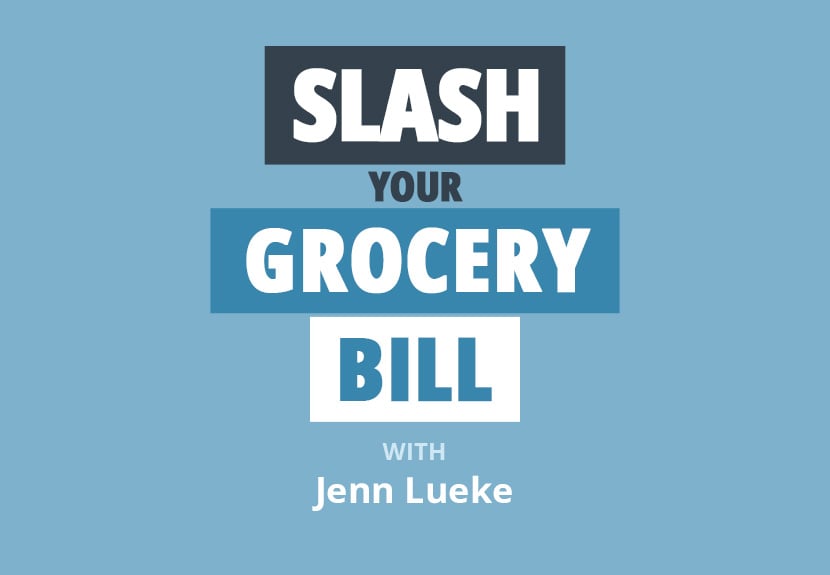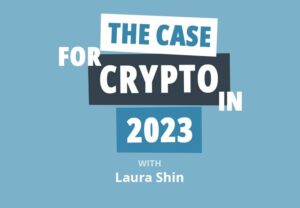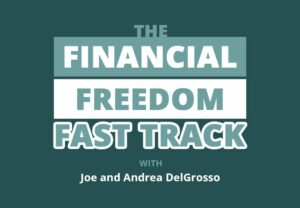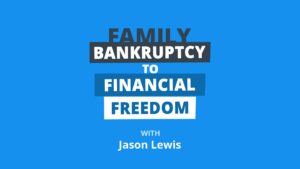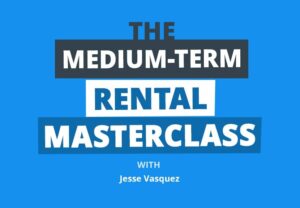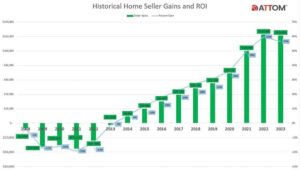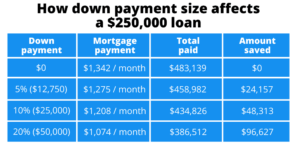
Healthy meals that taste great AND save you money? Surely, you can’t have all three! Today’s guest would beg to differ. After deciding roughly six years ago to embrace a healthy lifestyle, she made it her personal mission to find clean recipes that were equally affordable and flavorful. Today, she saves roughly $150 – $200 on her grocery bill each week!
Welcome to a special bonus episode of the BiggerPockets Money podcast. Today, our hosts Mindy and Scott pick the brain of Jenn Lueke, a food blogger who teaches people how to curb their monthly food spend and prepare healthy, craveable dishes that keep food exciting.
Have you always wanted to improve your diet without breaking the bank or spending countless hours in the kitchen? Do you wish that healthy choices tasted a little better? Tune in as Jenn talks about how she plans and preps all of her meals ahead of time, sticks to a tight grocery budget even amidst inflation or an economic downturn, and keeps all of her food organized in a one-bedroom apartment. You’ll even learn about her top budget-saving foods, go-to one-pan recipes, and favorite places to shop!
Click here to listen on Apple Podcasts.
Listen to the Podcast Here
Read the Transcript Here
Mindy Jensen:
Welcome to the Bigger Pockets Money podcast bonus episode edition where we interview Jenn Luki from gooodeats.com and talk about how to make healthy and budget friendly meals. Hello, hello, hello. My name is Mindy Jensen and with me as always is my health-nut co-host Scott Trench. Well health-nut minus his Cheezits addiction.
Scott Trench:
Mindy, I’m going to catch you outside with this particular web episode. We’re going to save you a lot of money.
Mindy Jensen:
Scott and I are here to make financial independence less scary, less just for somebody else, to introduce you to every money story because we truly believe financial freedom is attainable for everyone, no matter when or where you are starting.
Scott Trench:
That’s right. Whether you want to retire early and travel the world, going to make big time investments in assets like real estate, start your own business or shave a few hundred or a few thousand dollars off of your monthly food budget, we’ll help you reach your financial goals and get money out of the way so you can launch yourself towards your dreams.
Mindy Jensen:
Scott, you said a few hundred or a few thousand. I actually know somebody who, she came up to me and she’s like, “I have this friend who spends $3500 on groceries every month.” I’m like, “Oh, we should talk. Have her call me.” That’s a lot of money. Jenn is not spending $3500 a month on groceries. She’s spending about what, 500 on groceries, and she’s got some great tips and some pretty mouthwatering looking recipes on her website for eating healthy on a budget.
Scott, we have a new segment on the show called money moment, where we share a money hack tip or trick with our listeners to help them on their financial journey. Today’s money moment is timely to this episode. Did you know you can get virtual coupons for your trips to the grocery store? Download the grocery store’s app or visit their website.
All right, before we bring in Jenn, let’s take a quick break. And we are back. Today we are speaking with Jenn Luki, a food blogger who specializes in making delicious and healthy meals on a budget. She has a blog where she documents all of her recipes at gooodeats.com. That’s good with three O’s because they’re so good you need an extra O. You’ll be saying, ooh, I love this recipe. Jen, welcome to the Bigger Podcasts Money podcast. I’m so excited to talk to you today.
Jenn Luki:
Thank you so much for having me on. I’m so excited to be here.
Mindy Jensen:
So I have two kids and Scott has an infant, so he doesn’t know this yet, but those kids want to eat every day and coming up with new meals that they will actually eat can be really, really daunting sometimes. Let’s talk about you and how you got interested in food because you got interested in food about the same time that my kids are about the same age my kids are right now, so I want to encourage them to be interested in more than just Cheetos.
Jenn Luki:
Love it. Yes. I have been interested in food forever. I was basically following my parents around the kitchen when I was younger, just basically always around and observing, and I was a huge Food Network kid, so that’s actually where I learned a lot of my tips and tricks for cooking.
And I got into kind of the healthy side of eating about five or six years ago when I just wanted to dive more into living a healthier life. But came to find out that not all the recipes are all that good, and it’s not always that inexpensive to eat healthy too. So that’s kind of where I merged the idea of eating healthy on a budget, but also making recipes that taste really good and that you’re actually excited to eat and they’re crave worthy. So that’s kind of how I got into this space.
Mindy Jensen:
Well, let’s talk about it a little bit, why do most people associate healthy eating with a high price tag? Because I mean, other than the obvious, it’s super expensive to eat healthy.
Jenn Luki:
I think a huge part of it is that we’re told if we want to be healthy, eat healthy, we have to do everything under the sun, when really you can pick and choose what works best for you, and I think that’s super important. And also you have to know how to hack a little bit, which is a lot of what I like to talk about.
There are ways to eat healthy on a budget. There are ways to just live a healthy lifestyle on a budget, and you don’t have to do every single thing that every influencer, TV show, whatever it is telling you that’s going to make you healthier.
Scott Trench:
Love it. So what are some of your kind of specific recommendations? How would you go about tackling this for an average family?
Jenn Luki:
So when it comes to actually grocery shopping and figuring out what you’re going to buy, I think it starts with before that figuring out what you’re actually planning to make and it takes time. It’s an investment of time to eat healthy on a budget because you have to have the foresight to plan what you’re going to do to not waste food and to pick out things that are budget friendly.
So my biggest recommendation is before you’re going to head to the grocery store, take that 30 minutes or 45 minutes to take inventory of what you have in your fridge or in your pantry, figure out what you want to make. And that’s different for everybody. Some people like to look online and find recipes or I know a lot of people use Pinterest or Instagram or TikTok or whatever it is to save recipes throughout the week or the month.
Maybe it’s a recipe they just know and love or from a cookbook, depending on what it is, figure out what you’re going to make and then take stock of what you have and make a list of everything that you would need. You can evaluate from there if it’s actually in your budget to make all these fancy recipes.
You definitely don’t need to be making a fancy recipe every night of the week. I make a lot of basics and I know for a lot of people that’s what works because they’re working, they have families, there’s just a lot going on and not everybody has an hour to put into a fancy meal, so don’t be afraid to do something simple.
I’m a huge fan of sheet pan meals, one pot, one pan meals, things like that. And those are very searchable online too, so it’s helpful to figure out what you’re going to make, make that list. And then when you go to the grocery store, you’re not just there picking up random things that might go to waste, that may might not be in your budget, and you’re using everything that you buy throughout the week so it’s more budget friendly.
Scott Trench:
What are some good rules of thumb? What does a family come to you spending and making on an average basis, and what do you think is possible or reasonable for them to change too after following your program?
Jenn Luki:
I think so the biggest thing is to utilize some of those more budget friendly staples and then make meals around that. So for me, I’m not usually making a meal or a grocery list based off of filet mignon and wild caught salmon, a lot of seafood. Those are foods that I like, but they’re expensive and there are more expensive vegetables and fruits and there are less expensive ones.
So very much picking those staples that are budget friendly like chickpeas is a huge one for me because it’s a really good source of protein, but they’re very inexpensive. And same with tofu. It’s a great source of protein. You can find tofu for under $2 at a lot of grocery stores now. So it’s a really, really budget friendly, plant-based protein option. And then kind of picking those other proteins, even the proteins from animals like ground turkey, ground chicken, the more budget friendly options, that can be really good if you season it right, if you cook it in a recipe with a lot of things.
And then of course some of those more common stables like rice or quinoa, it makes a lot and it costs just a couple of dollars. So I definitely recommend doing those. There’s a lot of different brown rice pasta, chickpea pasta. I love that stuff. I love beans overall because beans are very, very budget friendly and shelf stable, so you can stock up, especially if there’s a sale, and then keep that on hand for a very, very quick dinner.
I love sweet potatoes. I love frozen vegetables because they’re very budget friendly. They last forever obviously, and you can just throw them onto a sheet pan meal or one pot meal, just mix it into your pasta while it’s boiling. So frozen veggies are awesome. So I would say the number one thing would be look for those budget friendly options and then build a meal around it.
If you’re going to build a meal around tofu, it’s a lot easier to pick out the other options rather than just, I have no idea what I’m going to make. I’m just going to run to the store and pick up random things and I don’t know if it’s actually going to make a meal at the end of the day.
Mindy Jensen:
Oh yeah, I feel seen with that last comment. I have definitely walked into the grocery store with no plan in mind. Oh, this looks interesting. This looks interesting. When you get home and you just got ingredients, you don’t have anything to make a meal.
Jenn Luki:
Yeah, for sure.
Mindy Jensen:
Well, let’s talk about what budget friendly means to you because the average family can spend $300 a week on groceries. That’s like 12, $1300 a month, which is like, that’s my mortgage payment. That’s a lot of money. How much can a family or individual cut down on their budget through bulk buying and meal prepping, and what does your budget look like?
Jenn Luki:
I think the most important thing to say is that everybody’s budget is going to look different and you can be trying to cut down on your budget and still have a different budget than somebody else. So it’s obviously highly personalized. It depends on how many people are in your family.
For me, I just live at my apartment with my fiance. There’s two of us. So our budget is going to look a lot different than somebody who has five kids. So I don’t think there’s an exact formula for what your budget’s going to be. I think that’s something you need to evaluate on your own and decide what it’s going to be, but it’s important to actually have that decision.
Know going into it, what do you want to spend. For me, I try to not spend between my fiance and I try to not spend more than 130 to $140 a week on groceries, but my goal is usually to get under 100 and it’s very possible and we eat a diet that’s really clean, really healthy, and we’re able to do it by shopping the sales, getting those staple items that I just mentioned, and most importantly planning
Scott Trench:
That’s awesome. So what does good look like in terms of grocery spending? Obviously it varies by family. The average is 1300 a month, you’re spending closer to five, $600 a month on groceries or 100 to 140 a week. Let’s go through that process that you use to arrive at that. And we talked about ingredients, we talked about storage. How do you frame it? Is it planning first? Where do you start the process for arriving at good in terms of grocery spending that you’ve clearly achieved for yourself?
Jenn Luki:
Yeah, for sure. It is definitely the planning and I think it’s also deciding. I think time is also part of it. It’s an investment of your time and it’s an investment of your money. And if you’re willing to put in an investment of your time, not just for the planning, which is obviously very important, but for the prep, you can really do a lot.
For example, we love to do overnight oats, overnight chia oats, chia seed pudding, things like that for breakfast throughout the week. And that’s something that’s very, very budget friendly because oats, for example, you can get a big bag for under $5 at some stores like Costco. We love to shop at Costco because you can get a huge bag of even high quality, organic, whatever you’re looking for, you can get a really big bag for $6 I think it is.
So that’s a really great option, and you can just put in 20, 30 minutes of time on Sunday to prep some overnight oats with some almond milk, some oats, some chia seeds, maybe some peanut butter or whatever you like. So that makes one meal throughout the week, very, very budget friendly. I have some other kind of basic meal prep breakfast that I like to make.
I like to do an egg casserole with a lot of veggies and protein in there. I like to do copycat Starbucks egg bites, so I’m not going through the drive through in the morning to grab my breakfast. So that’s one way that you can start to save. And then something that’s very helpful for us is whatever we have for dinner the night before, we try to make extra so that we can have it for lunch the next day and just kind of bulking it like that helps save a lot of money. So the number one meal that I like to plan out is my dinners.
Mindy Jensen:
So I’m hearing you say a lot of planning in advance and a lot of preparing for, we all eat two to three meals a day depending on what diet you’re following if you’re doing intermittent fasting or eating regular, whatever, but you’re eating every day. You have to eat every day this. It shouldn’t be a surprise and yet every night at dinner I’m like, oh, what am I going to make?
I wasn’t expecting to feed my family every evening. I heard you say something very important though. I do these Starbucks egg bites, I make them in advance so I’m not going through the drive-through. That right there is going to save you so much money just by thinking ahead. And as I just ground breakingly stated, you’re going to eat every day. So make these plans in advance.
And I mean, when my daughter was first born, my mom said to me, and this was really, really great advice, she said, “Know what you’re going to have for dinner by nine o’clock in the morning,” because babies are all over the place, but babies are kind of like life too. Life comes at you and it throws loops at you all the time. So if you just have a plan in advance by nine o’clock in the morning, know what you’re going to eat so you’re not scrambling to go through all those random ingredients because you didn’t have a plan when you go to the grocery store, what does your plan look like when you’re planning it? How far do you plan in advance? Do you plan by week? Do you plan by month?
Jenn Luki:
I can break it down into the details. And I do want to recognize too, that it’s hard to do all of this and I know it can be a lot on people just figuring out, like you said, what to have for dinner tonight. That can be hard when you have so many different responsibilities to manage. So I definitely want to recognize that.
And I still go through the Starbucks drive-through and get the egg bites and things like that, but I think people don’t realize how much money they actually end up spending on things like that. Getting the takeout once a week or twice a week adds up, getting your coffee and egg bites in the morning adds up. So if you can put more of that investment into your grocery bill and cook at home when you can, not only is it probably going to be better for you, it’s going to be more budget friendly and that’s an investment worth making upfront, even if it feels like you’re getting a lot of groceries on the weekend.
But to answer your question about how I actually go about planning it. My usual schedule is on Friday afternoon or on Saturday mornings, I’ll determine those dinners that I make, like I mentioned. I’ll pick out four or five recipes that I want to make throughout the week for sure. And then I’ll write a list of everything that I would need to make it.
So let’s say on Friday I’m picking out I’m going to do a sheet pan meal with chicken sausage and sweet potatoes and broccoli with some rice. So that would be one dinner and I’d probably end up using that for some lunches throughout the week too. So I’d write a list of everything that I needed and then if there’s anything that I already had, like I have some ground rice in my pantry, I have some sweet potatoes, I’m just going to cross that off the list.
I don’t need it, but I know that that’s the meal I’m going to make. So at the end of this process, I’ll have five meals at least at the top that I’ll be making next week. And then I have that so I can put it on my fridge or put it in my Notion or my notes app, whatever you use to track it. That alone is so, so helpful and it generates a full list for you.
So when I’m ready to go to the grocery store Saturday or Sunday or whenever anybody does their grocery shopping, I can look at that list and I know exactly what I’m getting, no distractions at the store. I’m going to have everything that I need on the list and that will cover also those breakfast, like the overnight oats, if I’m going to make that, I’ll have written that down if I want to do something additional for lunches, if I want to get some cold brew coffee so I don’t go through the drive-through, I’ll include everything on the list and have a plan.
And I might not make every single meal on the list at the end of the week, things come up, maybe I got busy, I did end up getting takeout or my parents brought over dinner or whatever it is, that’s okay, but if I have this plan, I can throw something in the freezer, make it next week and make it adaptable.
Scott Trench:
I have a two part question. How much time does it take you to implement this plan on a weekly or monthly basis, whichever you want it? And that includes planning, food preparation and shopping. And how much time do you think that that is over and above the average American household?
Jenn Luki:
I would say timing, I’ve gotten pretty quick at it because I’ve been doing this for a while. But I would say on the conservative side, probably 30 minutes picking out what meals I’m going to make and making that list. If you combine some of the time throughout the week, I’ll save some recipes that look good or I’ll have an idea and I’ll just jot it down.
And then also the time of seeing what I have in my freezer that I could use or in my pantry. So all that together I would say takes about 30 minutes. And this is a process that you could do alongside like a partner or your roommates or whatever it is. So that’s one thing to note. And then the actual preparation of the meals, it really depends.
It depends what I’m making. But I do try to put aside about 90 minutes at least on my Sundays, and that’s like my time for meal prep and it just pays off so much throughout the week. So that’s when I’ll put together those overnight oats or the egg bake, or maybe I’ll prep a couple of dinners or the dinner that I make on Sunday night, I’ll have for lunches throughout the week and make a bunch.
So I love to have that time to prep what I’m going to have. And it could range from sometimes I have plans on the weekends, sometimes I might not even do it and I’ll prep. One tip that I really, really love is when I’m making breakfast in the morning, if I didn’t prep some overnight oats or something like that, I’m frying up some eggs or whatever it is, I will prep my dinner for that day while the breakfast is cooking. So if I have eggs on the frying pan, I’ll grab a sheet pan and bake off. I’ll make that sheet pan of the chicken sausage and the sweet potatoes and the broccoli that I mentioned and then it’s ready.
So that’s one way that you can save time for something like that. If you have time in the morning, maybe when people are making their kids lunches for school, they can throw something in the oven or they can put something in the crock pot, whatever it is. So that timing really does vary. But I will say I think it’s become more popular to meal prep on a Sunday or one day of the week.
Spend that 60, 90 minutes, maybe two hours to do that meal prep. I don’t think everyone does it. So I would say I’m above the average a little bit and I also love it, but if you can make it fun, if you can look forward to it, if you can think of it as self-care, it becomes a really fun part of your week and it just makes you feel really good knowing you don’t have that pit in your stomach when it’s Tuesday morning and you don’t know what you’re having for dinner Tuesday night. So it is kind of that time investment upfront. But it does take time.
Scott Trench:
So my next question here and follow up is that sounds like multiple hours, four or five, six hours throughout the course of the week to prepare this food. And you are an expert, right? You are a professional at this. That’s why we’re talking to you. Suppose you’re talking to someone like me who does very little of the food preparation in the house and I’m not very skilled at this.
This seems very overwhelming. Just the recipe you listed was like, I don’t even know how to do that. How long do you think it would take someone like me to enact your plan in the first few weeks? I’m not looking. There’s no way. I’m doing it in six hours. So what do you think, what would be your estimate of time commitment in the first few months while I began getting as skillful as you?
Jenn Luki:
Well this kind of goes back to what I was saying at the beginning is a lot of people feel like they need to do everything or nothing when it comes to eating healthy or planning out your meals or eating on a budget in general. And you don’t have to do everything. Everything I just listed, I can fully recognize that that’s a lot and it’s become a huge part of my life.
Not everybody’s ready for that full commitment and I totally get it. And for some people the time trade-off is worth it for the money. So some people, it’s worth it to go to Sweet Green or wherever it is you like to go for your dinner and pay that money rather than taking the time to prep because your time is valuable. And I think that’s really important and that’s something that you need to evaluate on your own.
But to start off, I mean you could do this for two meals a week. If you’re planning your groceries on Friday, you’re still going to maybe show up, see what looks good in the aisles, pick up a few things, maybe grab a rotisserie chicken or whatever. And that stuff works perfectly. But if you can start maybe plan two meals that you can look forward to next week, look at a cookbook you have or look on Instagram, look on Pinterest, see what just sounds exciting to you and really make it fun. Pick those up.
And then maybe after doing that for a month where you plan two meals a week, maybe pick up one more, maybe pick up a breakfast prep idea, you can kind of compound because that’s how I’ve done it. I didn’t just one day wake up five years ago and say I’m going to start putting six hours a week into meal prepping and eating healthy and in making it cost-effective as well. But you really pick up the skills more quickly than I think you would expect.
Scott Trench:
So before I met my wife, who I am very lucky, she does most of the cooking because she’s so much better than me at it, I had basically two meals that I would make. One was breakfast, I’d make an omelet that I thought was delicious with a lot of vegetables and then for dinner I would saute a whole onion, mix it with some green beans and maybe one other vegetable.
And then I’d either make steak or chicken. And I had this every single night. So my meal prep and planning, well I do is doing what you’re saying, but not in a very fun way. And no one told me that they could smell the onion on me essentially all of the next day and going into that. So this was put an end to by my wife after that.
That was why I was asking because I feel like to branch out beyond my two recipes that I’m very good at would require a significant investment that I was not willing to make then. And I don’t know if I’m willing to make now. So I was just curious your opinion on that particular item.
Jenn Luki:
I mean whatever works, aside from maybe the onion smell, I don’t know, if it works for you, I don’t think there’s anything wrong with doing repeats, having the same thing for breakfast every day, whatever works. It’s so personal. Some people can eat the same thing for lunches the entire week and they love it.
Some people are like, I’m never going to finish the prep if I prep the same thing every day for a week because I just get sick of it. So it is personal, but you’ve got to figure out what works for you. But there is ways to make it more approachable, more budget friendly, no matter what you’re doing, if you’re going to do that planning beforehand.
Mindy Jensen:
Well, and let’s talk about the time aspect of this. How long does it take you to get into your car, drive to a restaurant, wait for a table, order your meal, wait for them to cook it, have them bring it to you, you eat it, then you drive home versus you take 60 minutes or 90 minutes or six hours and you prep on Sunday.
I mean, if this is something that you really like, which I mean I love to cook, it’s just after you have children tell you so many times every single night, wow, I hate it, you start to feel like maybe I’m not such a good cook. No, they just suck sometimes. Kids are just really difficult to cook for sometimes.
And I’ve even started getting HelloFresh boxes lately because I’m looking for fresh recipes, I’m looking for fresh ingredients and I just don’t have the ideas right now. And that’s not budget friendly, but it is healthy and it’s working for my family for right now and then I’m saving the recipe card so that I can make them later, the ones that my kids actually like.
Jenn Luki:
Yeah, that’s a great tip. And I think too, it’s more cost-effective than going out to dinner in most cases or even grabbing takeout. And I think again, that’s a good first step. Maybe you do HelloFresh two nights a week, you plan a meal one other night, a week that you’re going to cook and you just start there and add it on.
Scott Trench:
So go. Going back a few minutes here, how much time, you said it’s five or six hours, how much money do you think you save on your groceries per week with this approach over what you think an average American household in your situation would? What do you think the alternative is in terms of monthly or weekly spending for food for your household?
Jenn Luki:
I think, well the alternative is, I mean before comparing to some of my friends and what they tell me they spend or even my parents and growing up seeing how our grocery situation worked because I don’t know if we fully had it down, but we’ve worked on it in the last couple of years, and then also as I’ve refined the process, I guess, I’ve saved a lot of money.
I don’t know exactly what the savings are, but I do know that I personally almost never ever throw an ingredient away, ever. I’ll either freeze it or I’ll use it. And that alone is a huge cost savings because people throw away a lot of groceries, a lot of those veggies sitting in the back of the fridge or chicken that you forgot to cook and then it went bad and you had to throw it away.
I mean, that really adds up. And if you have a plan of what you’re going to make, you know what’s in your fridge, what you need to use up, you have these recipes saved that you’re excited to make, you’re way less likely to waste that food. And food waste alone is a huge cost. And then when you’re able to bulk up, use the more budget friendly ingredients like the rice or the pasta, the chickpeas, the ground turkey that you buy in bulk at Costco, things like that, you’re going to start sloshing down the prices. And with how expensive groceries have gotten, I think everybody could use some of those practices to try to make it a little bit more affordable.
Mindy Jensen:
Really reeling seen here with that comment about throwing away so many ingredients.
Jenn Luki:
Yeah, it’s hard. It’s hard to use up everything. That’s why when you go to the store and you pick up, oh, this looks like a vegetable I might use this week, and you throw it in the fridge and you kind of forget about it and you don’t have a plan for it, it’s very easy for that to end up in the trash two weeks later. So when this is allocated to this recipe or I’m going to put it in my omelets in the morning throughout the week, and you have that plan in the back of your head that’s going to be so helpful to not waste and to ultimately save money as a result.
Scott Trench:
I’d speculate that you’re saving 150 to $200 a week through this planning mechanism over the average American household would be my guest. Does that feel right?
Jenn Luki:
Yeah, it definitely feels right. And when you think about the cost savings of not grabbing takeout every day or going through the drive through in the morning or going out to eat a lot, I mean, that can save you probably even more than that.
Mindy Jensen:
Where are you shopping? What stores do you target?
Jenn Luki:
So this is something people ask me a lot and I think I want to say that you can shop budget friendly at almost any store before I answer because I really do think that’s true. Even stores like Whole Foods, which I think get a rep for being probably at the top most expensive. You can in with a plan, you can pick out ingredients strategically and you can shop on a budget.
That being said, I love to shop at Aldi, which I know is not everywhere because they have really, really good prices because they kind of just throw everything on the shelf and it’s not organized that well and they don’t have grocery carts and they keep it very budget friendly because of that stuff. So I really like shopping at Aldi. As I mentioned, I love shopping at Costco. I talk about Costco deals a lot on my page because there are some really, really good healthy foods that you can get in bulk at Costco.
So I’ll grab, like I mentioned, ground turkey or ground chicken or chicken thighs at Costco and then when I get home I’ll package them up into my freezer and use it throughout the month. So that’s very helpful. I also shop at Trader Joe’s a lot, which is kind of a contentious topic sometimes on my videos where some people think that Trader Joe’s is very budget friendly, other people think it’s more of an expensive marked up store.
I personally find Trader Joe’s to be very affordable for the things that I’m getting. They obviously have the packaged food that they can upcharge you on, but if you’re really just getting produce, your proteins, your canned goods, other pantry staples, I find it to be very affordable. And then some more regional stores around here like Market Basket and Stop and Shop.
I know there’s different ones for everybody, but I will kind of, depending on what I’m getting, select a certain store because if I’m going to get more meats, maybe I’ll go to Aldi because I know they have a better price or Costco so I can get it in bulk. But if I’m going to get more pantry staples, maybe I’ll run to Trader Joe’s. So it really does depend. And if you are able to go to more than one store, if they’re close to each other, that’s really helpful too, if you are really on a budget and you want to get the cheapest option for everything.
Scott Trench:
I think it’s fun how there’s an identity that seems to form around people depending on where their preferred shopping location is. I would say my mine is Costco personally, and then I run a podcast on financial responsibility, but Whole Foods is quite magical, one the few times that I do go to Whole Foods. And Mindy has very strong opinions as well. So Mindy, which retail shopping chain do you most strongly identify with?
Mindy Jensen:
I love Costco because I can buy food and clothes at the same place, which is the best. But also I have two teenage girls and yeah, they’re girls, but they eat linebackers. So I am buying a lot of food and it’s cheaper at Costco in many cases, not in all cases, but organic food is very, very expensive at the regular grocery store. What does Jim Gaffigen say? Organic is a grocery store term that means twice the price.
It’s really expensive to buy organic strawberries at my local grocery store, but at Costco organic strawberries are 12 cents more than the regular strawberries, which are already at a really great price. So I love Costco.
Jenn Luki:
And I agree on Costco and I think it goes back to the personalization too because if you have a family and you have more people to feed, Costco is an amazing option. For me, I live in a one bedroom apartment in the city, so I can’t get everything at Costco because I literally just don’t have the space to put it.
So it really just depends on your preferences and feel free to shop around and find things. And just on the organic point, another thing that’s very helpful for if you’re somebody that wants to get organic foods is be smart about what you’re actually going to get because you don’t need to get everything organic.
And I think a lot of people know that, but also a lot of people don’t. If something has a skin around it, for example, like bananas or avocado, it’s a lot less important to be getting an organic option than something like you mentioned strawberries or spinach. You can look up online what the Dirty Dozen is too, and that will show you the top fruits and vegetables that do have those pesticides so you can kind of shop organic for the dirty dozen. Everything else just get conventional. So again, be strategic, be smart, use the resources that are out there because there are a lot.
Scott Trench:
That’s a great tip, really appreciate that. Let’s talk about storage for a minute because you live in … We’ve met folks, we had a guy who achieved financial independence with a family of what, 15 kids or some absurd number like that. And this dude had a freezer, a big box, basically a big freezer box in his garage and just went to Costco, loaded that thing up every time there was a sale, that kind of stuff. You live in the city, so you don’t have that option because you don’t have that storage space. What are your tips for people maybe perhaps, that are less extreme or more practical on an ongoing basis to store food?
Jenn Luki:
It is hard when you have limited pantry space, limited freezer space. So I don’t think you have to be insane about it. You don’t have to do extreme couponing, keeping a stock for five years of chickpeas in the pantry, for example. But there are things that take up less space like canned food does take up less space.
So for me, I can make an argument for getting 10 cans if there’s a really good sale and then using it for even a couple of months in some cases. Whereas other things like my vegetables, I try to buy my vegetables fresh as much as possible, even if it’s 50 cents more or whatever it is over frozen because I just sometimes don’t have the freezer space. And I would rather use the freezer space for those meats that I get at Costco so that I can fit my organic chicken thighs in the freezer rather than my organic broccoli because I can buy it fresh and it’s not too big of a price difference.
So it’s being strategic about what you’re going to pick. And then also not just getting things that take up a lot of space in general in the fridge. Honestly more of the processed packaged foods are going to take up more space. So even in the refrigerator if you’re going to get all different kinds of drinks and whatever, I don’t really get a lot of that stuff.
So I’ll save more of the space for everything that I meal prepped, which takes up a lot of space. And then the basics that need to be refrigerated, like my almond milk and my eggs and my fresh veggies that need to be refrigerated. So you really do have to pick and choose, but it is tough. It’s an ongoing struggle living in a small apartment sometimes. I have pantry things in weird spots, but it works.
Scott Trench:
So another two part question. This sounds a lot like Tetris and you must be a master at that particular game. And two, what do you do with prepared food? How do you think about the storage of that and is that a major part of your strategy with the planning and meal prep you do on Sundays?
Jenn Luki:
Yeah, it’s a part of the strategy and I think more than anything it’s about keeping your refrigerator organized on an ongoing basis. So I do try to, every Sunday after I do that 60, 90 minutes of meal prep or whatever it is, I will spend five to 10 minutes just organizing my fridge, pulling the things out from the back, making sure there’s nothing hanging out back there that I missed that’s going to go bad.
So that’s really helpful for going back to how we talked about saving money by not wasting food, but also keeping everything organized so you can fit all of your prep and I’ll kind of take stock of what’s in there. And sometimes I’ll realize that I had a head of broccoli in the back that I didn’t use so I can make a mental note that I’m going to throw it into this one pot meal I’m going to make later in the week just as an extra veggie.
But if you take those five to 10 minutes, just organize everything down, make it nice. You don’t have to do a huge fridge overhaul, clean out in three months when you don’t know where anything is and there is rotting onions in the back.
Mindy Jensen:
Are you peeking at my kitchen, Jenn? Because I feel seen with that question too, that comment too.
Jenn Luki:
You I think a lot of us are in that scenario.
Mindy Jensen:
Every few months I’m just like, well let’s take everything out of here. Ew, what is that? I don’t even remember the last time I made that. What are some good recipes for our audience members to start with that are easy to prep, healthy and inexpensive?
Jenn Luki:
So I’ve mentioned kind of a few of my staples of what I look at, but the biggest things that are great for saving time, saving money and eating healthy are any kind of one pan, one pot sheet pan type of meal. And there are a lot of options. I definitely encourage people to just Google or search on Pinterest or whatever your preferred method is to search one pot healthy meal or if you have an ingredient in mind, search one pan recipes with chicken and broccoli.
And there are so many recipes out there that there’s going to be tons of options. You’ll be able to find something you like or if you want to do a slow cooker or an instant pot, air fryer, there are just so many options. So some things I like are, I love to do a one pan meal with chicken and I’ll sear the chicken and then throw in some chicken broth and some rice and then put the chicken back in and put it into the oven for 20 minutes.
And you get this one pot meal with rice, you can throw some veggies in there. I’ll mix in some spinach or some kale and chicken on top. It all cooks at the same time. And when it comes out of the oven, you have a 30-minute rice, veggies and chicken meal and you can do it with orzo, you can do it with the chickpea rices that they have now. There’s so many ways to do it. I have a couple recipes on my website for that too.
So that’s one of my favorites. And I love a good sheet pan meal. Like I mentioned, I’ll do chicken sausage or chicken breasts or Turkey, you can do anything. And tofu is perfect for that too. I’ll do a sheet pan with tofu and some veggies that I like and throw some soy sauce or coconut aminos on top. Make it very simple. You can put it on rice too if you like that. And it’s a perfect meal.
Scott Trench:
Awesome. Well, is there anything else you want to cover before we wind up here, Jen?
Jenn Luki:
I don’t know. We covered a lot of my number one tips. I guess I would say try to shop seasonally to save money on, especially those fresh fruits and vegetables and herbs. And if you have farmer’s markets in your area, definitely check those out because some of the best prices that I’ve gotten on fresh produce and herbs and plants even are going to those farmer’s markets, exploring around and they’re like a dollar for a bunch of cucumbers or whatever it is. So utilize that shop seasonally. And it’s also just great nutritionally to eat seasonally because they’ll be more nutrients in there.
Scott Trench:
Awesome. Well really appreciate it. This sounds like a great opportunity for many of our listeners to harvest a lot more of their paycheck by not spending it needlessly on food and waste. So we appreciate it. Jenn, where can people find out more about you?
Jenn Luki:
So you can find me on Instagram or TikTok or YouTube at Jenn Eats Goood. It’s Jenn with two Ns, Eats Goood with three O’s, so you can find me anywhere there. And then my website is gooodeats.com with three O’s and my recipes are posted there so you can find me anywhere. You can send me a message, let me know any questions you have. And thank you for having me on today.
Mindy Jensen:
Jenn, thank you for these tips. I’m scrolling through your recipes right now and I’m like, oh, I’m going to make that, I’m going to make that. Your pictures are fabulous and now I’m starving. So thank you so much.
Jenn Luki:
Of course. I hope you make something.
Mindy Jensen:
I will. I will send you a note about how delicious it is because these all look fantastic.
Jenn Luki:
Please do. I love that.
Mindy Jensen:
And we will talk to you soon. Thank you so much, Jenn.
Jenn Luki:
All right, thank you. Bye. All right,
Mindy Jensen:
Scott, that was Jenn Luki and that was a lot of fun. I got some great tips. I felt a little bit seen in some of those comments, but it’s not like she’s calling me out because I’m doing great things. I really do need to get better at the food waste thing.
Scott Trench:
I’m such a novice at this. I mean, look, food is one of the big three expenses, transportation, housing, and food. That makes up two thirds of American household spending is just in those three categories. So we talk about housing, house hack, right? That’s the best way to eliminate your housing expense if you’re able to do it or live and flip if you want your own place, figure out a way to add value.
Those kinds of things, like that’s how we knocked that out. Transportation, it’s a reasonable, I hopefully paid off economy vehicle is one of the best ways to cut that expense or if you are extreme, biking or walking as the primary means of transportation. And then the food budget comes down to discipline, planning and execution, right? Reasonable purchases from reasonable grocery stores using a planned process. And Jenn’s is absolutely outstanding.
For me, when I was doing all this five, six, seven years ago, I had one recipe and one thing, and that made it very easy to do this because I would just eat the same thing all the time and had my own little route to this. Anytime I tried to vary from that, the time investment just got crazy. I wish I had a resource like Jenn that I could have followed and maybe developed this skill a little bit more.
I do wonder though, I saw think it was Alex Hormoze posted something that was to the effect, eating out for him as a really good investment because it saves him so much time. You just order something in a minute or two and it shows up 45 minutes later. And I wonder what your reaction would be to that concept for maybe, perhaps higher income earners.
Should they invest the time to learn the skill of food preparation the way that Jenn has laid out here? Or is that investment likely not worth it for them if you’re above a certain income threshold? I’d be curious to hear your thoughts on that, Mindy.
Mindy Jensen:
My go-to is, yes, they should invest that time. I think that cooking is a life skill. It’s not just saving time and money right now. This is, you’re learning how to do something so that if you are ever in a position where you don’t have access to restaurants and food apps, you can still eat.
And I think that that’s an important thing to know the basics of. Although if you don’t have access to restaurants and food apps, how are you going to cook it anyway? I really like to cook. I liked it better when I was cooking just for my husband who enjoys my cooking and not for my kids who are like, ewe, this is gross, every single time I make anything, even something that they have previously liked. Girls, if you’re listening, which they’re not. So I can say all these things, but my gut says you should learn how to cook.
Scott Trench:
I tend to agree with you with the caveat that that was clearly worth it for me five, six, seven or eight years ago, and I wonder if I would be doing the same thing today. And I think it’s an open question that I think we should leave hanging for folks. I bet you there will be some disagreement on that point from reasonable parties on both sides.
Mindy Jensen:
Well, I would love to hear what our listeners have to say in our Facebook group, which can be found at facebook.com/groups/bpmoney. We’ll post a question in there.
Scott Trench:
Well, I’d be interested to hear what people think. And thanks again to Jenn for coming on and sharing her wisdom with us. Should we get out of here, Mindy?
Mindy Jensen:
We should. That wraps up this bonus episode of the Bigger Pockets Money podcast. He is Scott Trench and I am Mindy Jensen saying, smoke me a kipper. I’ll be back for breakfast.
Scott Trench:
If you enjoyed today’s episode, please give us a five star review on Spotify or Apple. And if you’re looking for even more money content, feel free to visit our YouTube channel at youtube.com/biggerpocketsmoney.
Mindy Jensen:
Bigger Pockets Money was created by Mindy Jensen and Scott Trench, produced by Caitlin Bennett, editing by Exodus Media. Copywriting by Nate Weintraub. Lastly, a big thank you to the Bigger Pockets team for making this show possible.
Watch the Podcast Here
[embedded content]
Help us reach new listeners on iTunes by leaving us a rating and review! It takes just 30 seconds. Thanks! We really appreciate it!
In This Episode We Cover
- How to save on your grocery bill ($150 or more!) each week
- The best ways to optimize food storage with limited space
- Finding easy, cheap, and healthy recipes that become household staples
- How to plan and prep meals for HUGE time savings
- When to buy organic produce instead of conventional
- Shopping seasonally to take advantage of lower prices (and fresher produce!)
- And So Much More!
Links from the Show
Connect with Jenn
Interested in learning more about today’s sponsors or becoming a BiggerPockets partner yourself? Let us know!
Note By BiggerPockets: These are opinions written by the author and do not necessarily represent the opinions of BiggerPockets.
- SEO Powered Content & PR Distribution. Get Amplified Today.
- PlatoAiStream. Web3 Data Intelligence. Knowledge Amplified. Access Here.
- Minting the Future w Adryenn Ashley. Access Here.
- Source: https://www.biggerpockets.com/blog/money-405
- :has
- :is
- :not
- :where
- $UP
- 10
- 100
- 12
- 20
- 24
- 30
- 50
- 500
- a
- Able
- About
- about IT
- above
- absolutely
- access
- achieved
- actually
- add
- addiction
- Additional
- Adds
- advance
- ADvantage
- advice
- affordable
- After
- ago
- ahead
- AIR
- alex
- All
- allocated
- alone
- alongside
- already
- also
- alternative
- Although
- always
- am
- amazing
- American
- amidst
- an
- and
- animals
- Another
- answer
- any
- anywhere
- Apartment
- app
- Apple
- appreciate
- approach
- apps
- ARE
- AREA
- argument
- around
- arriving
- AS
- aspect
- Assets
- Associate
- At
- Attainable
- audience
- author
- average
- away
- back
- Bad
- bag
- based
- basic
- Basically
- Basics
- basis
- basket
- BE
- because
- become
- becomes
- becoming
- been
- before
- began
- Beginning
- being
- believe
- BEST
- best prices
- Bet
- Better
- between
- Beyond
- Big
- big box
- bigger
- Biggest
- Bill
- Bit
- Blog
- Bonus
- border
- born
- both
- Both Sides
- Box
- boxes
- Brain
- Branch
- Break
- Breakfast
- bring
- brought
- budget
- build
- Bunch
- business
- busy
- but
- buy
- Buying
- by
- call
- called
- calling
- CAN
- Can Get
- car
- card
- cases
- Catch
- categories
- caught
- certain
- chain
- change
- Channel
- cheap
- cheaper
- cheapest
- check
- Children
- choices
- Choose
- City
- clearly
- Close
- closer
- clothes
- Co-Host
- Coffee
- cold
- COM
- combine
- come
- comes
- coming
- comment
- comments
- commitment
- Common
- comparing
- Compound
- concept
- conservative
- content
- conventional
- cooking
- copywriting
- Cost
- cost savings
- cost-effective
- Costs
- could
- Couple
- course
- cover
- covered
- crave
- crazy
- created
- Cross
- curious
- Cut
- day
- Deals
- decide
- Deciding
- decision
- definitely
- Depending
- depends
- details
- Determine
- developed
- DID
- Diet
- differ
- difference
- different
- difficult
- Dinner
- dinners
- do
- documents
- does
- Doesn’t
- doing
- Dollar
- dollars
- done
- Dont
- down
- download
- dozen
- dreams
- drinks
- drive
- drive through
- each
- Early
- easier
- easy
- eat
- economy
- editing
- edition
- effect
- Eggs
- either
- eliminate
- embedded
- encourage
- end
- Entire
- equally
- especially
- essentially
- estate
- estimate
- evaluate
- Even
- evening
- EVER
- Every
- every day
- everyone
- everything
- exactly
- example
- excited
- exciting
- execution
- Exodus
- expect
- expecting
- expenses
- expensive
- expert
- Exploring
- extra
- extreme
- families
- family
- fan
- fantastic
- Favorite
- Favorites
- feel
- few
- Figure
- financial
- financial freedom
- financial goals
- Financial independence
- financial responsibility
- Find
- finish
- First
- fit
- Flip
- follow
- followed
- following
- food
- foods
- For
- forever
- form
- formula
- Forward
- found
- four
- FRAME
- Free
- Freedom
- Freeze
- fresh
- Friday
- friend
- friendly
- friends
- from
- frozen
- Fruits
- full
- fully
- fun
- game
- garage
- General
- generates
- get
- getting
- girls
- Give
- Go
- goal
- Goals
- Goes
- going
- good
- goods
- grab
- great
- Green
- groceries
- grocery
- gross
- Ground
- Group
- Growing
- Guest
- Guy
- hack
- had
- hand
- Hard
- harvest
- Have
- having
- he
- head
- healthier
- healthy
- hear
- heard
- hearing
- help
- helpful
- helps
- her
- here
- Hidden
- High
- higher
- highly
- his
- Home
- Honestly
- hope
- Hopefully
- hosts
- HOURS
- House
- household
- housing
- How
- How To
- HTTPS
- huge
- hundred
- i
- I’LL
- idea
- ideas
- identify
- Identity
- if
- implement
- important
- in
- include
- includes
- Income
- independence
- individual
- inexpensive
- influencer
- INSANE
- instant
- instead
- interested
- interesting
- Interview
- into
- introduce
- inventory
- Invest
- investment
- Investments
- IT
- items
- Jim
- Jot
- journey
- jpg
- just
- just one
- Keep
- keeping
- Kid
- kids
- Kind
- Know
- Knowing
- Last
- later
- launch
- LEARN
- learned
- learning
- Leave
- leaving
- LG
- Life
- lifestyle
- like
- likely
- Limited
- List
- Listed
- Listening
- little
- live
- living
- local
- location
- Long
- Look
- look like
- looking
- LOOKS
- Lot
- love
- lunch
- made
- major
- make
- MAKES
- Making
- manage
- many
- many people
- marked
- Market
- Markets
- master
- Matter
- May..
- meals
- mean
- means
- mechanism
- Media
- Members
- mental
- mentioned
- message
- method
- might
- Milk
- mind
- minute
- minutes
- Mission
- mom
- moment
- money
- Month
- monthly
- months
- more
- morning
- Mortgage
- most
- much
- multiple
- name
- necessarily
- Need
- needed
- network
- New
- next
- next week
- night
- no
- not spending
- Notes
- nothing
- Notion
- novice
- now
- number
- obvious
- of
- off
- Okay
- on
- once
- ONE
- ongoing
- online
- only
- open
- Opinion
- Opinions
- Opportunity
- Option
- Options
- or
- order
- organic
- Organized
- organizing
- Other
- our
- out
- outside
- outstanding
- over
- overall
- Overhaul
- overnight
- own
- package
- packaged
- page
- paid
- PAN
- parents
- part
- particular
- parties
- partner
- Pay
- payment
- pays
- People
- perfect
- perhaps
- personal
- personalization
- Personalized
- Personally
- pick
- Pictures
- PIT
- Place
- Places
- plan
- planned
- planning
- plans
- plants
- plato
- Plato Data Intelligence
- PlatoData
- player
- please
- pockets
- podcast
- Podcasts
- Point
- Popular
- position
- possible
- Post
- posted
- pot
- Practical
- practices
- preferences
- preferred
- Prepare
- prepared
- preparing
- pretty
- previously
- price
- Prices
- primary
- probably
- process
- produce
- Produced
- professional
- Program
- Protein
- Proteins
- pulling
- purchases
- put
- Putting
- quality
- question
- Questions
- Quick
- quickly
- random
- range
- rather
- rating
- reach
- reaction
- ready
- real
- real estate
- realize
- really
- reasonable
- recipe
- Recipes
- recognize
- recommend
- Recommendation
- recommendations
- refined
- regional
- regular
- remember
- represent
- require
- resource
- Resources
- responsibilities
- responsibility
- restaurant
- Restaurants
- result
- retail
- review
- Rice
- roughly
- round
- Route
- rules
- Run
- Said
- sale
- sales
- same
- saturday
- Save
- saving
- Savings
- saying
- says
- scenario
- schedule
- School
- scrolling
- seafood
- Search
- Season
- seconds
- see
- seed
- seeds
- seeing
- seems
- seen
- segment
- send
- seven
- Share
- sharing
- she
- Shelf
- Shop
- Shopping
- should
- show
- Shows
- Sides
- significant
- Simple
- single
- Sitting
- situation
- SIX
- skill
- skilled
- skills
- Skin
- slow
- small
- smart
- Smell
- Smoke
- So
- some
- Someone
- something
- Soon
- Source
- Space
- speaking
- special
- specializes
- specific
- spend
- Spending
- Sponsors
- Spotify
- stable
- Star
- starbucks
- start
- started
- Starting
- starts
- stated
- Step
- Still
- stock
- Stop
- storage
- store
- stores
- Story
- Strategic
- Strategically
- Strategy
- strong
- strongly
- Struggle
- such
- Sun
- Super
- surely
- surprise
- sweet
- table
- TAG
- Take
- takes
- taking
- Talk
- talking
- Talks
- Target
- taste
- team
- tell
- terms
- than
- thanks
- that
- The
- The Basics
- the world
- their
- Them
- then
- There.
- These
- they
- thing
- things
- think
- Thinking
- this
- this week
- those
- thought
- three
- threshold
- Through
- throughout
- Throwing
- tiktok
- time
- times
- timing
- tip
- tips
- tips and tricks
- to
- today
- today’s
- together
- tons
- too
- top
- topic
- TOTALLY
- towards
- track
- trader
- Transcript
- transportation
- travel
- tried
- true
- Tuesday
- Turkey
- tv
- tv show
- Twice
- two
- type
- Ultimately
- under
- us
- use
- using
- usually
- utilize
- Valuable
- value
- Vegetables
- vehicle
- Versus
- very
- Video
- Videos
- Virtual
- Visit
- wait
- Wake
- Wake Up
- walked
- walking
- want
- wanted
- wants
- was
- Waste
- Way..
- ways
- we
- web
- Website
- week
- weekend
- weekly
- Weeks
- welcome
- WELL
- were
- What
- What is
- when
- whenever
- whether
- which
- while
- WHO
- whole foods
- why
- wife
- Wild
- will
- willing
- wind
- wisdom
- with
- without
- worked
- working
- works
- world
- worth
- would
- WoW
- write
- written
- Wrong
- years
- yet
- you
- Younger
- Your
- yourself
- youtube
- zephyrnet

